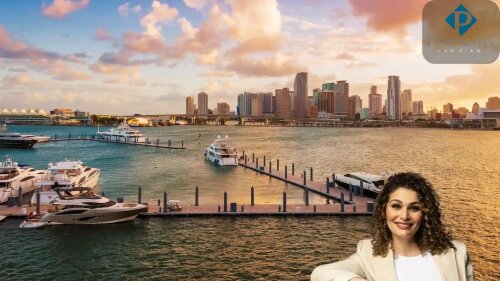Best Admiralty & Maritime Lawyers in Florida
Share your needs with us, get contacted by law firms.
Free. Takes 2 min.
Or refine your search by selecting a city:
List of the best lawyers in Florida, United States
About Admiralty & Maritime Law in Florida, United States
Admiralty and maritime law is a specialized field that governs legal matters related to navigation, shipping, and activities on navigable waters. In Florida, this area of law is particularly important given the state's extensive coastline, busy ports, cruise ship operations, and vibrant recreational boating scene. Admiralty law covers a range of issues, including personal injuries on vessels, cargo disputes, marine insurance, salvage operations, vessel collisions, and environmental concerns. Florida's unique waterways and its status as a maritime gateway make understanding these laws crucial for both individuals and businesses involved in maritime activities.
Why You May Need a Lawyer
There are several situations in which hiring a lawyer experienced in admiralty and maritime law can be essential in Florida:
- Suffering an injury as a passenger or crew member on a cruise ship or other vessel
- Facing claims for damages after a boat collision or accident
- Disputes involving cargo loss or damage during shipping
- Facing citations or enforcement actions for violating maritime regulations
- Pursuing claims related to salvage or towage services
- Handling environmental claims such as oil spills or pollution
- Dealing with insurance disputes related to marine policies
- Navigating licensing or registration issues for vessels
Maritime law is highly specialized and distinct from general state law, often involving federal statutes and unique legal procedures. A qualified lawyer can guide you through this complex legal landscape, protecting your rights and representing your interests effectively.
Local Laws Overview
Florida’s framework for admiralty and maritime law is shaped by a combination of state statutes, federal regulations, and longstanding international maritime principles. Key aspects relevant to Florida include:
- Jurisdiction: Many maritime cases fall under federal court jurisdiction, but certain claims can be heard in state courts under what is known as "saving to suitors" provisions.
- Personal Injury Claims: Crew members may be covered by laws like the Jones Act, while passengers’ claims may involve strict notice and filing deadlines, especially with cruise lines.
- Liability & Negligence: There are specific standards of care and rules governing threshold evidence for injuries, collisions, or property damage on water.
- Vessel Ownership & Registration: Both state and federal laws require vessels to be registered or documented, with specific rules for recreational and commercial craft.
- Environmental Regulation: Both state agencies such as the Florida Department of Environmental Protection and federal statutes like the Clean Water Act oversee pollution and hazardous spills.
- Salvage & Treasure Law: Florida has unique issues concerning shipwrecks and salvage rights, often involving claims from the state and federal government.
Understanding which laws apply depends on the vessel type, waterway location, and the specific circumstances of the incident. An experienced attorney can help determine the relevant laws and courts for your case.
Frequently Asked Questions
What is admiralty and maritime law?
Admiralty and maritime law is the body of laws that govern incidents, contracts, and injuries occurring on navigable waters, including oceans, seas, lakes, and rivers that support commerce.
What types of incidents are covered by maritime law in Florida?
This includes boat accidents, cruise ship injuries, cargo disputes, environmental contamination, salvage claims, personal injury or death at sea, and maritime employment disputes.
Which court handles maritime cases in Florida?
Most maritime cases fall under federal court jurisdiction, but some can be heard in Florida state courts depending on the nature of the claim and the parties involved.
How long do I have to file a maritime injury claim?
Time limits vary, but some claims, such as those involving cruise ships, may require written notice within six months and a lawsuit within one year. It is vital to act quickly to preserve your rights.
What is the Jones Act and does it apply in Florida?
The Jones Act is a federal law protecting certain maritime workers injured on the job. It allows eligible crew members to sue their employers for negligence. It commonly applies to crew members on vessels operating in Florida waters.
Can I sue a cruise line for getting injured on a ship?
Yes, but cruise lines have strict requirements for how, when, and where claims can be filed, often requiring suits to be filed in specific jurisdictions like Miami, Florida.
Are there unique laws for boaters and recreational vessels in Florida?
Yes, Florida law regulates vessel registration, operation, and safety, including requirements for life jackets, boating under the influence, and accident reporting.
Who is responsible for cleaning up oil spills or pollution in Florida waters?
Depending on the source, responsibility may fall on vessel owners, operators, or cargo shippers. Both state and federal laws impose reporting and cleanup obligations.
What are salvage rights?
Salvage rights allow a person or company to claim a reward for recovering another’s vessel or property at sea, under certain conditions established by maritime law and contracts.
How can a maritime lawyer help me?
A maritime lawyer understands complex regulations and court procedures unique to maritime law. They can evaluate your claim, help you meet critical deadlines, negotiate on your behalf, and represent you in court if necessary.
Additional Resources
For further information, you may find these resources helpful:
- Florida Department of Environmental Protection - Division of Water Resource Management
- United States Coast Guard - District 7 (Florida)
- Florida Fish and Wildlife Conservation Commission (FWC) - Boating and Waterways Section
- National Oceanic and Atmospheric Administration (NOAA) - Office of Coast Survey
- United States Maritime Administration
- U.S. District Courts for the Southern, Middle, and Northern Districts of Florida
- Maritime Law Association of the United States
Next Steps
If you believe you have a legal issue involving admiralty or maritime law in Florida, take the following steps:
- Gather all documents related to your case, such as accident reports, contracts, correspondence, medical records, and vessel documentation.
- Note all deadlines for filing claims or lawsuits, especially if you are dealing with cruise lines or employment matters.
- Consult with a qualified admiralty and maritime lawyer as soon as possible to evaluate your options and ensure you do not waive any rights.
- Use the resources above to educate yourself further and learn about your responsibilities and potential remedies.
- Follow your lawyer’s advice regarding communication with other parties, insurance companies, or regulatory bodies.
Admiralty and maritime law is complex and involves strict procedural rules. Prompt legal advice is the best way to protect your interests and achieve a favorable outcome in Florida’s maritime environment.
Lawzana helps you find the best lawyers and law firms in Florida through a curated and pre-screened list of qualified legal professionals. Our platform offers rankings and detailed profiles of attorneys and law firms, allowing you to compare based on practice areas, including Admiralty & Maritime, experience, and client feedback.
Each profile includes a description of the firm's areas of practice, client reviews, team members and partners, year of establishment, spoken languages, office locations, contact information, social media presence, and any published articles or resources. Most firms on our platform speak English and are experienced in both local and international legal matters.
Get a quote from top-rated law firms in Florida, United States — quickly, securely, and without unnecessary hassle.
Disclaimer:
The information provided on this page is for general informational purposes only and does not constitute legal advice. While we strive to ensure the accuracy and relevance of the content, legal information may change over time, and interpretations of the law can vary. You should always consult with a qualified legal professional for advice specific to your situation.
We disclaim all liability for actions taken or not taken based on the content of this page. If you believe any information is incorrect or outdated, please contact us, and we will review and update it where appropriate.
Browse admiralty & maritime law firms by city in Florida
Refine your search by selecting a city.













